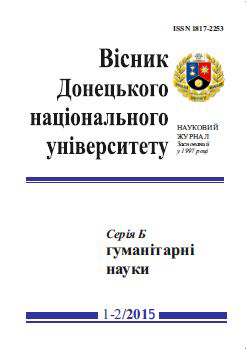About some problems of relationship Postmodern and Postnonclassical science.
Keywords:
science, postnonclassical science, postmodernizm science, narrative, rhizomes, simulacrum, synergy, chaos, valuesAbstract
In the article we analyze the relationship of interdependence Postmodernism and Postnonclassical science, study problematic situations that arise in their epistemological dialogue. In the early 70-th of the last century, the scientific and cultural field was be determined of assimilation Postmodernism and Postnonclassical rationality, and create a new paradigm of understanding reality. The problem of correlation Postmodernism and contemporary science of his time was determined by J.-F. Lyotard. Today it is traced parallel between Postnonclassical science with its uncertainty, incompleteness and fundamental postmodern methodological guidelines. At the same time with thoughts of originality postmodernism discourse of science, the trivial vision of reality is rightly critical remarks about the postmodernists, the essence of which is the illegal transfer of naturalistic terminology Postnonclassical Science in Postmodernism. Too much errors and theoretical confusion, that is related of using of the terms "linear", "chaos", "determinism", "topology", what was appeared in mathematical chaos theory and applied in specific situations in philosophy, cultural studies, social sciences. In addition to the positive impact Postnonclassical and postmodern science there are some problems and natural mathematical correlation methods to the analysis of social problems that are unlawful transfer of a terminology in piecemeal application of methods of exact sciences.
To avoid of such situations it is possible with the high level of preparedness of the philosopher in the exact and natural sciences and the wise use of achievements in the humanitarian field naturalists knowledge.
References
Судас Л.Г. Постмодернизм [Электронный ресурс] / Л.Г. Судас // Режим доступа: http://www.chem.msu.su:8081/rus/teaching/sociology/postmodern.html
Лиотар Ж.-Ф. Состояние постмодерна : Трактат о знании / Ж.-Ф. Лиотар; [пер. с фр. Н.А. Шматко]. — М. : Институт экспериментальной социологии; СПб. : Алетейа, 1998. — 160 c.
Можейко М. А. Нарратив / М. А. Можейко // Всемирная энциклопедия : Философия ХХ век [главн. науч. ред. и сост. А. А. Грицанов]. — М. : АСТ, Мн. : Харвест, Современный литератор, 2002. — С. 491.
Микешина Л.А. Философия познания. Полемические главы / Л.А. Микешина. — М. : Прогресс-Традиция, 2002. – 624 с.
Михайлов А. Литература и философия языка / А. Михайлов. — Логос. Изд-во РГГУ, 1996. — № 8. – С. 62-70.
Маньковская Н.Б. «Париж со змеями» (Введение в эстетику постмодернизма) /Н.Б. Маньковская. — М.: ИФ РАН, 1995. — 271 с.
Лук’янець В. С. Науковий світогляд на зламі століть: [Монографія] / В. С. Лук’янець, О. М. Кравченко, Л. В. Озадовська та ін. — К. : Вид. ПАРАПАН, 2006. — 288 с.
Режабек Е. Я. В поисках рациональности (статьи разных лет): / Е. Я. Режабек. — М. : Академический проект, 2007. — 383 с.
Сокал А., Брикмон Ж. Интеллектуальные уловки. Критика философии постмодерна / Перев. с англ. А. Костиковой и Д. Кралечкина. Предисловие С. Капицы. — М.: «Дом интеллектуальной книги», 2002. — 248 с.
Топологія // Українська Радянська Енциклопедія. Т. 14. — К.: Книжково-журнальна фабрика Головполіграфвидаву Міністерства культури УРСР. — С. 165.

